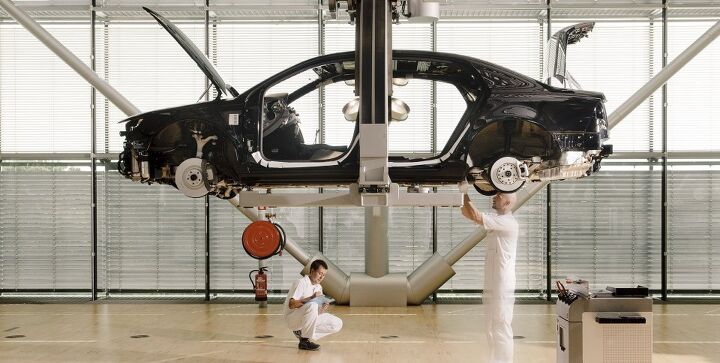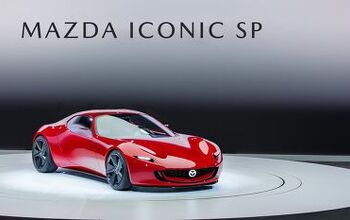No Fixed Abode: Farewell to the Transparent Dream

Just short of ten years ago, I clambered out of a claustrophobia-inducing Lufthansa coach seat in Frankfurt, grabbed my luggage, and headed for the parking garage. I had paid for my own flight — which did not surprise me in the slightest, because I was a cycling journalist at the time, not an automotive one. After a brief disagreement with my wife concerning the likely German phrase for “parking garage,” we found the right building, then the right floor, and finally the right spot. Occupying the spot was a Volkswagen Phaeton not entirely unlike the two that I’d left in my driveway at home. It was a short-wheelbase model with a VR6 and a specification too modest to ever cross the Atlantic, but the relative familiarity of the car and the controls made it slightly easier for me to get used to driving in Germany.
As we headed east and the evening fell in the windshield ahead, the perfect order and strident prosperity of what I’d grown up calling “West Germany” gradually faded, replaced by open fields, small towns, and abandoned concrete cube housing sprouting a decade’s worth of weeds. We were on our way to Dresden — to the ruined cathedral, to the cobblestones, to what Sandra, my bright-red-haired guide, called “the Saxon temperament.” We were headed to Die Gläserne Manufaktur. The Transparent Factory.
Germany, of course, is where Volkswagen builds its follies, in both the literal and architectural senses of the term. There’s the Autostadt, that bizarre theme park that lets you experience a mist-shrouded intimidation-by-Aventador. When the production team behind the Clive Owen action film “The International” wanted to showcase some outrageous buildings, the two places they secured permission to film in were the Guggenheim in New York and the main Autostadt showcase in Wolfsburg. You can order a new Volkswagen in Germany and have it automatically delivered to you from a massive crystalline tower. Frankly, it all kind of makes the RenCen look like a Best Western.
Die Gläserne Manufaktur is on yet another level entirely. It’s a manufacturing plant, but it’s one with hardwood floors, quasi-levitating platforms, and barely a solid wall surface to be seen anywhere. I’ve worked in and around automotive assembly plants quite a bit over the past decade. They’re all noisy, crowded, frenetic places. Even the best-practices modern plants, like BMW’s facility in South Carolina and the East Liberty plant where Civics are made, are dangerous places where ear protection is required and people follow carefully painted lines on the floor lest they lose their lives in the space of a moment thanks to a swinging welder or fast-moving automated transport.
In the Transparent Factory, by contrast, you could hold a quiet conversation or play a parlor-sized acoustic guitar for a friend. I found this out firsthand when I visited the place as part of an American Phaeton owner’s group activity. We were given a late lunch in the massive suspended globe above the main lobby that serves as executive dining hall and musical performance space. They sat me next to the plant manager (“Ah, you are the American with two of our cars,” he noted) and provided me with a plate on which vanishingly small portions of lamb and parsley were framed by a half-circle of caviar.
I was set free to roam the factory, which even at the time was rather more busy building Bentley Flying Spurs for the European market than it was with Phaetons. The highlight of the tour was the “marriage station” where the Volkswagen D-platform’s massive backbone driveline was bolted into the unibody in a computerized ballet that was ethereal to watch due to its muffled silence.
“This is the button that performs the marriage,” the worker told me. A blue Flying Spur waited, still in bachelorhood, above us.
“Can I push the button?” I asked.
“It is forbidden,” he replied, in clipped English. Sandra, my minder, turned away. “Push the button,” he whispered, winking. So there’s a 2007 Flying Spur somewhere in Germany for which I performed the marriage. Hope it held up okay.
The Transparent Factory was more than a simple assembly plant. It was an expression of Ferdinand Piech’s ultimate vision for Volkswagen: a few highly-trained Germans assisting a multitude of flawless machines as they created consumer objects of impeccable desirability and function. My compatriot Basem Wasef, no stranger to caviar or overseas flights himself, wrote a piece about the 21 most interesting features of the plant a while back. These various facts were all explained to me as I wandered from station to station, but I was struck more by the otherworldly spirit of the place than by any particular bit of trivia regarding Canadian maple flooring. It was truly a folly; beautiful, fascinating, impractical.
No longer. Production of the Phaeton stopped last week as Volkswagen finally admitted failure in as quiet a manner as possible. Bentley production is all at Crewe now, as far as I know, so there’s nothing left to build. The factory is being revamped to be “a showcase for electromobility and digitalisation,” which to my Generation X cynicism means not a fucking thing. They say that production could resume at some point in the future. I wouldn’t hold my breath.
We left Dresden that afternoon and headed to Berlin. Over the next week, our trip eventually took us to Cologne, the Nurburgring, and even Castle Baruth itself. Well. Calling it a “castle” is a bit of an overstatement. There are bigger McMansions in Columbus, Ohio. The current Baron, the castle’s owner, managed to recover it from the German government after unification and half a lifetime of being a mere private citizen under the hammer and sickle. The place needs some work, to put it mildly. Still, what does your family’s castle look like? The good news is that you can get a decent pizza just a short walk away, although “pepperoni” to a German pizza-maker means “green peppers.” Don’t do that.
The town of Baruth merged with its neighbor, Mark, a while ago, creating “Baruth/Mark.” (My suggestion, to name it “Bark Maruth” in honor of a certain Ohio musician’s drunk-alias-to-even-more-drunk-groupies, was not honored.) Things in East Germany are kind of tough lately. A lot of the people, and a lot of the jobs, went West. In that environment, the Transparent Factory stood as a sort of monument to the sheer power of Piech’s will; the sheer hubris required to create a 12-cylinder Volkswagen and a hardwood-floored assembly plant in which to build it and then to place it all in the East because hey, why not? There was something majestic about it. I meant that in the classic sense. To stand on the floor of that factory was, after a fashion, to understand the creation of Versailles.
Having told its diesel customers that they could have their cake and eat it too for so long, VW is now preparing to meet its own royal fate, perhaps in the French fashion as well. I don’t offer any excuses for the men who made those decisions, and I don’t agree with those who think that the government has no business regulating emissions in the first place. That doesn’t mean that I don’t mourn the Transparent Factory’s closure. You can think of it as the fall that must follow pride, or as a folly in itself, but you would be a fool not to see Die Gläserne Manufaktur for what it is: a human triumph of ambition and vision. We should all dream so large, consequences be damned.

More by Jack Baruth
Latest Car Reviews
Read moreLatest Product Reviews
Read moreRecent Comments
- Jrhurren Worked in Detroit 18 years, live 20 minutes away. Ren Cen is a gem, but a very terrible design inside. I’m surprised GM stuck it out as long as they did there.
- Carson D I thought that this was going to be a comparison of BFGoodrich's different truck tires.
- Tassos Jong-iL North Korea is saving pokemon cards and amibos to buy GM in 10 years, we hope.
- Formula m Same as Ford, withholding billions in development because they want to rearrange the furniture.
- EV-Guy I would care more about the Detroit downtown core. Who else would possibly be able to occupy this space? GM bought this complex - correct? If they can't fill it, how do they find tenants that can? Is the plan to just tear it down and sell to developers?



































Comments
Join the conversation
Thanks Jack. I really enjoyed this one, and I don't really know why. I think it's the mid story "it's forbidden. ... Push it!" It makes the whole emissions test cheat seem more human, more understandable, and more German. One silly line and I'm more at peace with and understanding of VW's circumstances.
Just a thought: fly into München, spend a day or two, take a 4 hr train ride to Zurich and then onto Geneva. Or skip Zurich and spend a little more time travelling to Geneva (via Prague?) i think easyjet and other low-cost carriers fly to/from Geneva regularly.